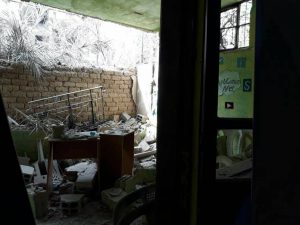Samah is a widow and a mother of two children. Her husband was killed five years ago during the aerial bombardment on Ghouta. He left her struggling in the harsh circumstances of life, even starving as she was unable to provide food. Nevertheless, she as most of the women of Ghouta, refused to surrender to her situation, and decided instead to weave into her pain and suffering a ray of hope to illuminate her children’s path.
 Samah says, “I was alive.. The life was black in my eyes, until I knew the Women Now center. My whole life has changed, socially, and even economically. I got out of sadness and depression, and learned a profession and now I can feed my family.”
Samah says, “I was alive.. The life was black in my eyes, until I knew the Women Now center. My whole life has changed, socially, and even economically. I got out of sadness and depression, and learned a profession and now I can feed my family.”
At the center, Samah first learned nursing and later sewing, and then left to work in a sewing workshop, to provide her and her daughters with the most basic life’s necessities, with a monthly salary of 10,000 Liras which is around 20 U.S. dollars.
When I asked her how she could live with this small amount, she replied, “We forgot about electricity, and regarding the water we get it from the well and I bring into the house in buckets. As for clothes, well I buy cloth and sew new ones by hand, or I mend the girls’ old ones. “Food,” she said, “I buy just enough of to keep us alive. And in truth, we are almost to the point of eating grass, as our diet consists almost entirely of spinach and chard, as well as a few other vegetables such as cauliflower. She added sarcastically, “And of course we eat our meals without bread and only once a day.”
When I asked her about her spirits, Samah said, her eyes glimmering of resilience to live: “The situation in Ghouta is extremely difficult. The prices are unimaginably high. All I want is to live to see my daughters grow up. I mustn’t surrender in the face of these conditions: not to the bombing, the hunger, the fears, or the repression.
It’s true that our food is grass, and the simplest of life’s necessities are nowhere to be found, but we will continue to resist until the last breath, and, bring struggle behind us so that we may finally be able to relax. Only when we can again breath free, when we can again go out without fearing bombs and planes, when the bandits among us are gone, and when brothers stop killing each other just because they belong to such-and-such faction, when there are no longer merchants who monopolize certain foods just to keep them out of the hands of another faction or to profit at our expense, only then will life become sweet again. And from now until then we will preserve our strength, so that our life will be sweeter than before.”
Samah is an example of all the women of Ghouta, who, in spite of their wounds, were able to overcome the difficult circumstances. Samah was able to lift her small family from the brink of destruction. She was able, with her patience, determination, and faith, to break the siege, and she lit a new candle of hope on the road to freedom…
